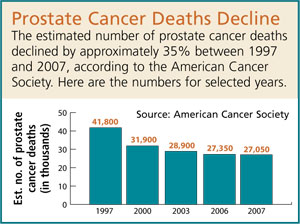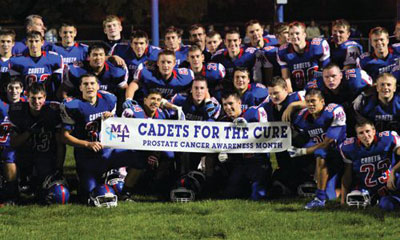To QUEST Readers, My Patients and Their Families

Last May, I was invited by the American Urological Association to give the Ramon Guiteras Lecture. This opportunity was an honor for me, as I was selected by my own professional association to give this lecture to the membership.

In reviewing the literature and thinking about the topic, I reflected on just how far we had come over my career in saving lives of men by screening with PSA and then offering appropriate therapies to victims of this disease, the second deadliest cancer killer, after lung cancer.
It gave me satisfaction to know that I was a part of this effort. While I deal with men and this disease, I have followed with interest women’s struggle with breast cancer and was impressed with the vociferous, strong, and successful response that women displayed when, in the fall of 2009, the USPSTF issued warnings against the use of mammograms for early detection of breast cancer.
Compassion and Science
My interest is one of not only human compassion, being a husband and grandfather of a little girl, but also scientific thought, as there is a strong correlation between breast cancer and prostate cancer that is passed from one generation to another, sometimes across genders.
Little did I know that within twenty-four months, this same government agency would take on efforts to curtail the screening of men just as it had done to curtail the screening of women. My fear is that the men and their organizations will not be as well organized and successful as those of women in minimizing the impact of this recommendation.
Everyone should have the opportunity to be screened for cancer and to determine what options to take if faced with a future of cancer. I strongly believe that PSA is the best screening test available for prostate cancer, and until there is a replacement for PSA, it would be unconscionable to stop it.
A Sausage-Grinder Approach

The USPSTF states that its draft recommendation is based on a “meta-analysis” of five studies. A meta-analysis is taking data from different studies and combining all of the information as though it were from a single well-conceived and well-executed study to reach a valid conclusion. It is a sausage-grinder approach to science.
Further, even if one subscribes to the use of “meta-analysis” it is necessary to see if the studies are such that they can be analyzed in this way. Three of the five clinical trials the USPSTF relied upon to make its recommendation were of very poor quality and none of the studies was representative of how PSA testing is currently used. The other two were of better quality and showed the substantial benefits of the test in decreasing prostate cancer deaths. Putting all five studies in one pool diluted the results of the two higher-quality studies.
This method would be akin to using two fresh and three spoiled bananas to create a smoothie, then concluding that bananas should no longer be used in smoothies because the resultant mixture tastes bad.
The authors of a systematic review of the meta-analysis the USPSTF relied upon for their recommendation stated, “Therefore, their meta-analysis could be regarded as seriously flawed when including studies of insufficient quality and/or insufficient follow-up.”
I led early studies on PSA screening, showing that it results in earlier detection, thereby, allowing men a wider array of treatment options.

Early Diagnosis is Everything
Because the cancer begins on the prostate’s outer edges, it produces no symptoms until it is far advanced and too late to cure. You can be a “healthy” man and have a steadily climbing PSA, which is trumpeting the danger alarm. Early diagnosis is everything. It is the cornerstone that has dramatically reduced death and suffering.
Prostate cancer is the most common non-skin cancer in men and the second-leading cause of death from cancer.
Since the simple blood test for PSA became widely adopted, death rates from prostate cancer have dropped 40 percent in the United States and also decreased in other countries where the testing is widespread but not in those where it is not used. In addition, the National Cancer Institute database shows a 75 percent decrease in patients who have advanced cancer at diagnosis since PSA testing became widespread.
Effects on Medicare and Private Insurance

This USPSTF draft recommendation, if implemented, could result in Medicare and private insurance companies not covering the cost of the test and would be especially detrimental to the health of men with a family history of prostate cancer and to African-American men, who are 50 percent more likely to have prostate cancer and 200 percent more likely to die of it. Yet, African Americans were not included in studies used to make the guidelines that could result in increasing healthcare disparities.
Implied in the USPSTF recommendation, incontinence and impotence are being measured against saving lives. The fact is that both side effects of prostate cancer treatment are greatly diminished with an experienced surgeon and other ongoing improvements in the quality of treatment. They should not be used as fear tactics in the face of life-saving screening and treatment.
If accepted by the government, this recommendation would essentially become healthcare rationing, in which only people who can pay out-of-pocket, would receive this life-saving test and lowincome people would be disenfranchised.
To arrange an interview with Dr. Catalona, contact Erin White, Northwestern University Broadcast Editor, at (847) 491-4888 or ewhite@northwestern.edu.
Early Diagnosis of Prostate Cancer Through PSA Testing Saves Lives







